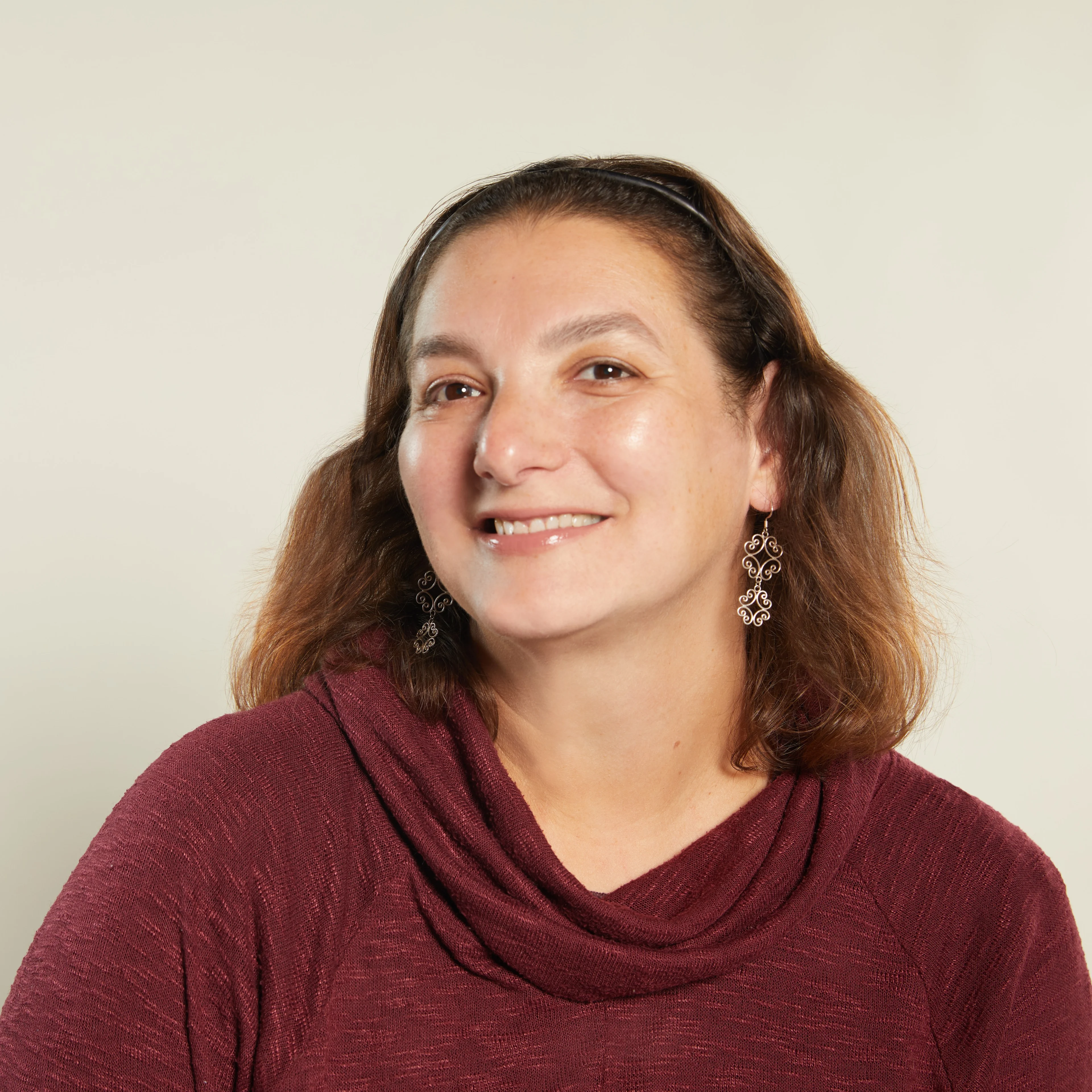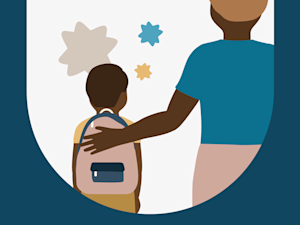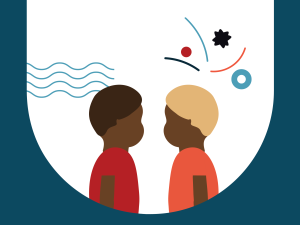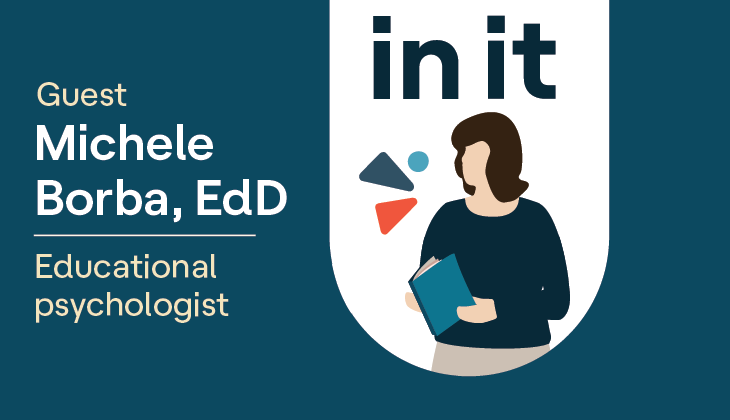Stay in the know
All our latest podcasts delivered right to your inbox.
What does it mean to thrive? And how can we help our kids become thrivers?
In this episode, hosts Amanda Morin and Gretchen Vierstra talk with Dr. Michele Borba — a parenting expert and former special education teacher — about her book Thrivers: Surprising Reasons Why Some Kids Struggle and Others Shine. Listen in to hear Michele’s definition of thriving, and the seven strengths that help kids thrive. You’ll learn practical, actionable ways to help kids develop those strengths at any age.
Related resources
And check out Michele’s book: Thrivers: Surprising Reasons Why Some Kids Struggle and Others Shine
Episode transcript
Announcer: Discover all of Understood's podcasts, where we talk candidly about challenges with reading, writing, focus, and other learning differences. Our podcasts bring new voices and perspectives you won't hear anywhere else. Explore the highs and lows of raising kids with learning challenges. Learn about the surprising ways ADHD symptoms can surface in kids and adults. And hear stories from working professionals who learn and think differently. On the Understood Podcast Network, there's a podcast for everyone. Find your new favorite today at u.org/podcasts or wherever you find your podcasts.
Amanda: Hi, I'm Amanda Morin. I'm the director of thought leadership for Understood.org. And I'm a parent to kids who learn differently.
Gretchen: I'm Gretchen Vierstra, a former classroom teacher and an editor here at Understood. And this is "In It."
Amanda: "In It" is a podcast from the Understood Podcast Network. On this show, we talk to parents, teachers, experts, and sometimes even kids. We'll offer you perspectives, stories, and advice for and from people who have all types of learning differences.
Gretchen: Today, we're talking about how to help our kids thrive.
Amanda: What do we mean by thrive? Well, in a new book called "Thrivers," Dr. Michele Borba defines thriving kids as kids who are happy, healthy, and high-performing.
Gretchen: Michele writes that kids who thrive have some combination of the following seven strengths: confidence, empathy, self-control, integrity, curiosity, perseverance, and optimism. And she emphasizes that all of these strengths can be taught to kids at any age.
Amanda: The book isn't specifically about kids who learn differently. But Michele is a former classroom and special education teacher, as well as an educational consultant and parenting expert. And we know she has great insights on how all kids can thrive.
Gretchen: We're so glad she's here to talk to us today. Michele, welcome to "In It."
Michele: Oh, thank you. I've been so looking forward to this.
Amanda: We're so excited to have you here. I was telling Gretchen how we met. That we met at a conference, in an elevator, and then you did this amazing keynote speech on how to raise good humans, right? And what I really liked about that is we all sort of ended up thriving together. At the end of that keynote speech, you had everybody get up and sing the theme song to "Cheers."
Michele: I have to give you a footnote to that. The theme song from "Cheers" came from a 15-year-old. I'd asked her, "I understand you're depressed and you're struggling. Is there any bit of advice that I could give your principal or your teachers to help you?" And she says, "Well, there was this real lame show my mother watches on TV. It takes place in a bar, with Norm, Sam, and Rebecca." And I went, "Cheers?" She says, "Yeah." I said, "What do you like about the show?" She says, "It's the song. It's not the show." I said, "What's about the song?" She says, "It's what every kid needs: a place where everybody knows your name and everybody's glad you came."
Amanda: I didn't know that part of the story. That's so great.
Gretchen: That is such a great story. Michele, before we get into your research on helping kids thrive, we're wondering what made you write this book and, in particular, why now?
Michele: Well, I have to tell you, Gretchen, this has been a 40-year writing process. I actually started studying resilience way back when, in my ed psych classes, when I was working on my doctorate. And every single year, more and more research kept coming up that we can create thrivers — that thrivers are made, not born. And then all of a sudden I began to see this stirring stat that was really concerning me that one in five American kids suffer from an anxiety disorder. By the way, it's now one in three, because the pandemic hit. So I started asking the kids, 100 kids I interviewed, and I learned, every one of them saying "It's because we're not being raised to be humans these days. It's all about the test score. And somebody better teach us the skills on how to get along, communicate, adapt to change." Every kid was confirming what the research says, and that's the need for the book. It came from kids.
Amanda: And that's what I love about the book, actually, is so many of the things in the book come from kids themselves. We're hearing from them directly. In your book, you lay out seven strengths that we can help kids develop in order to thrive. Self-confidence, empathy, self-control, integrity, curiosity, perseverance, and optimism.
Michele: Amanda, those seven strengths took forever. In fact, they were identified on my dining room table with Post-its. What I did was go through every piece of research on resilience and then try to figure out what's the commonality between that work, that work, that work, and which of those things are teachable? And then what I did with the Post-its is start stacking, until I got to the point where "Where's the highest stacks?" Those became the seven. OK, those are the most highly correlated traits of success. And guess what? Everybody breathe. You don't have to teach all seven. It's a rare parent and it's a rare adult or teacher that has all seven of those. You don't. But the more you have, the better. My big "aha" moment as the researcher was, oh my gosh — not only do you not need all seven, but if you just have one, like self-confidence, and then you build the next one, like self-regulation, guess what? They have an amplifier effect. What we've been doing is teaching in isolation. Teach them together and they quadruple the impact, and your child now has more of a foundation to thrive.
Amanda: I will admit that, you know, as I read through that list, my heart kind of sunk a bit because raising kids with learning differences, some of these skills are really hard, especially self-confidence. And I was wondering, do you have advice on how to tackle self-confidence for kids who really struggle in the classroom or socially?
Michele: What we've been doing I think is too much emphasis on the deficit and the weakness and not enough emphasis on what the kid is naturally good at. If we start by nurturing the natural nature of the kid or what he loves to do, and then pass that on to Grandma, the teacher, the daycare worker, it helps the child realize that, no matter whatever comes his way, he's got something to help him stand up on his own two feet for.
Maybe all of us need to take a 3-by-5 card and walk around the house without the kids knowing we're watching, or in the classroom without the kids knowing we're watching. And when you notice that your child is a little more eager and engaged — there's a need for whatever it is. When the soccer camp stopped, you can see almost depression: "Now what am I going to do, Mom?" There's a real eagerness about it. That's a strength.
We do know that hobbies actually help kids thrive. They're highly correlated to resilience. And so I asked a number of kids, you know, prior to the pandemic, "What do you like to do for your hobbies?" And looked at me dumbfounded. What the heck is a hobby? Maybe we look at it and we carve in first in our children's schedule a little bit of the natural downtime. Not what you love but what your child loves to do. Is it reading? Is it music? Is it woodworking? If the child doesn't have a hobby, this is when you get Grandma to come in and start helping a kid learn baking, or Great Aunt Sally to teach knitting, and then watch what your child seems to enjoy. What we've discovered is that they take those hobbies with them the rest of their lives. I'm still knitting because of my aunt. The pandemic hit, what did I grab? My knitting needles. Because I knew that that's what I go to to help me just handle the stress a little more. That's the secret to beginning to help your child learn self-confidence.
Amanda: You know what I love about that is the concept that you talk about what they love and not what they're good at, right. And a hobby starts with what you love, instead of starting with what you're good at. Knitting is such a good example. I love it. I'm so bad at it, but it's still a stress reliever for me.
Michele: Yeah.
Gretchen: You know, with families of kids who learn differently, like let's say that the family is really worried about a kid's reading disability, for example. What do you say to families then about, "But it's just as important to not just focus on this thing you want your child to get better at because it's school-related, but other things, these other hobbies.” You know? There might be a kind of push and pull there when it comes to things like that.
Michele: I think the big thing that we've done is make everything into an either/or. It's not you do the hobby or you do the, should I help my kid with reading. Of course you help your child who is struggling in a particular area. I'm not saying stop helping him. But give him also a foundation to lift him up and realize he's got some real skills and some real assets.
Amanda: You know, one skill that you write about that I love? And you know this about me and Gretchen knows this about me, is empathy. I love empathy so much that I wrote a book on it. And part of what interests me about it is the way that people think about it: You either have it or you don't. And they also think that empathy looks a certain way. But as parents and teachers of neurodiverse kids, we know that's not the case, right?
Michele: Oh, Amanda, thank you for that. When you ask me, can I talk about empathy? Well, how many weeks do you have? Because I'm so passionate about it. First is, when I talk to parents, I can see one thing that we've done wrong. All I have to say is "Empathy. Our kids are hardwired for it, but unless you cultivate it, it lies dormant." And there's this "Whoa, I didn't know you can cultivate it." So I think the first thing is we got a lot more power as parents and teachers than we realized.
But the second thing is, please don't assume that your child doesn't have it if he watches the movie "Bambi" and isn't a basket case. That's the affective kind of empathy, and some children do. They show it. They come running in because their friend's upset and their whole face radiates with sadness. But the other child is more serious. The other child who doesn't show the tears. Don't misjudge the child.
The first one is the A-kind kid. That's the affective kind. That other kind is the C-kind of kid. He's the cognitive kind. Thank gosh there's that kind of kid, because Harvard says actually that's the most employable child we have. That's the kid who can step into the shoes of somebody and go, "How would I feel if that happened to me?" They're a little quieter because they're trying to understand where the person is coming from. Boy, we don't do that too well these days, do we know?
Amanda: No. I think I may have told Gretchen this story, but I'll tell it to you as well. I have two sons who are autistic, and they use that phrase. One of whom is now in his second year of college and this feeling of, like, empathy doesn't exist in autism. It makes him absolutely — it throws them over the edge. And then one day I get this text from him. I'm in the middle of a meeting at work, and I get this text from my son and he says, "You need to read this paper. It's all about the difference between affective and cognitive empathy. And I think I'm a cognitive empathy person." And I was just like, "That's a kid who I taught about empathy, and then went and started looking up 'empathy' and realized he could see himself in it."
Michele: That's exactly it. I taught autistic children for a very long time myself. They changed my whole perspective and dynamic, but so many misconceptions we have of children.
And too often, what we try to do is also do the cookie cutter approach: "It worked for that kid." Figure out what works for your child.
Amanda: It's so interesting to me to think through the difference between high-performing and thriving, right? I mean, or, or the connection, I guess. And for me it really hit home. I have a 25-year-old daughter, um, which makes me feel old when I say that out loud. I have a 25-year-old daughter who has significant anxiety disorder. And she talks about this herself. She has a bachelor's degree in multimedia visual arts. And yet for her, thriving is, she's found a great job at a local grocery store; she has roommates that she really adores; she can pay her bills. She's doing what she loves. For me, that took some readjusting as a parent, right, to let her figure out what thriving looked like for her. And I wonder, what do you tell parents when they're like, "But this isn't thriving."
Michele: The simplest thing is look at your footwork. Where are you in relationship to your kids? If you're always in front of your kid and pulling your child in the direction and doing for your child then, OK, good, admit it. Then the next thing is step back, and start doing side by side with your child until, pretty soon, your optimum thing is step, step, step, so you're, you are ultimately behind your child and your child is pulling you. Oh my gosh. How great is that? Because that meant your child is figuring out from the inside out who he is, what he needs. That's going to be a long-time journey. But we've overlooked that as a learning tool.
When we look at mental well-being, we're looking at a dismal rate of our children's well-being. Yeah, we've rated the smartest generation, but they're also the least creative, the most risk-averse, the least likely to be happy, and they're more anxious than any other generation. You put all those together and you go, "What are we doing? Maybe we need to reset in terms of our parenting," and start thinking, "What are we going to do to help our kids become the best they can be?"
Gretchen: So there's another strength you write about in your book: perseverance. In my experience in the classroom, I've noticed that kids with learning differences often work hard naturally because they have to, and so perseverance is something they're pretty good at already. Have you seen that in your work?
Michele: Yes. As a former special ed teacher? Yes, yes, yes. And then the parent would come in, and too often, "Well, how do I get him better?" And I said, "You're missing out on something here. Watch what he's doing right now. Watch how hard he's working."
One of the highest correlations of children who thrive is they have a sense of agency. Agency means "I got it. I can do it." And when they start measuring themselves based on, "Well, if I just work a little harder, cause here's where I am, but if I just put in the effort in it, I'll get better and better and better." That's the greatest confidence booster there is, because they realize it's not IQ or GPA or a zip code that makes the difference. If they themselves and how much they apply.
That chapter on perseverance, chapter six, is so critical because, you know and I know that the majority of research says that too often we parents do a huge, huge disservice. We emphasize the end product. We ask the "What'd you get? What was your grade? What was your score?" In fact, the first thing, when they come in, "How'd you do, what'd you get?" as opposed to "What kind of thing did you do? What brought you joy? What was the most fun part? What invigorated you? What did you learn differently?" We don't ask those questions. And what the kids are saying is, "That's what you're looking for; all you care about is the GPA."
Harvard — Harvard! — interviewed dozens of middle school and high school kids, and they asked that question. "What matters most, the GPA? That you're healthy and happy? That you're caring?" Eighty percent of American kids said, "It's the GPA that matters most in my house."
What went down to the dump hole? Twenty percent of the kids said kindness and caring. So they turned to the parents and they said, "Is this true?" And the parents went, "No! I want him to be kind and caring." But our messages aren't getting through. What the kid is hearing is "What'd you get?" as opposed to "What kind thing did you try?" or "What brought you joy?"
Amanda: I love that question, "What brought you joy?" I just, I love that as a question. It's what I'm going to start incorporating into my daily routine with my 11-year-old.
Michele: Well, Amanda, ask it to yourself too. We're all burnt out. We're doing it ourselves, and then we're trying to raise up the kids when our kids are mirroring our stress?
Gretchen: Yeah, I think that's one thing Amanda and I wanted to ask you about too. What do we do about parents, right? The families are stressed. Maybe if we as parents realized the joy that might come from focusing on a hobby, right? Then maybe we would understand and pass that on to our kids. So, I’m just looking for some advice you might have for families.
Michele: My advice is, number one, breathe a minute. Because the one commonality we have: every parent wants the best for their child. Every parent wants a happy, healthy kid. Everybody take a moment and breathe, cause the first step is once a parent realizes you can make a difference on your child's ability to thrive, first you go "I didn't know that." So maybe it's reading the back of "Thrivers" or doing a, starting a book club. Maybe it's just getting a fun — uh, Montreal has what's called parlor groups that I would say, boy, this is the way to go. I was doing an in-service and all the parents walked in, and it was kind of different because they all looked like they loved each other. They were bonded with each other. I've never seen a happier group of parents. I went, "Whoa, what the heck are you doing up in Montreal?" He said, "We started parlor groups. We start them in kindergarten." I said, "What's a parlor group?" "Well, the moment your kid goes into a class, they put you in a parlor group of about eight parents. You have to have at least one kid who's about the same age. And then you decide you're going to meet once a month and you're going to have coffee. The counselor comes to the first meeting, and they give you the rules on how you talk, so what stays in the group, you know, stays in the group, and no judging. And then we started talking about parents and what we need. And then we started doing book clubs, and then we started taking out newspaper articles about things we were worried about. And pretty soon, we were no longer doing coffee. We're doing wine and cheese, and we were really bonding and liking each other. We were no longer lonely. We realized that we could support each other. It changed our whole dynamics." That's the best thing I've ever seen.
Amanda: You know, what's so powerful about that, too, is that there are parents out there who feel like they're different, right? They feel like they're different. They feel like they're outside of the group, and just inviting them in makes them feel like they thrive.
Michele: Oh, Amanda, inviting them in — being invitational to another mom, another dad. We're all lonely. Then we've gone through two years of the loneliness epidemic. We've got to stop shaming each other. We've got to stop judging each other, and we've got to start inviting each other. And when we do, we're not only helping ourselves, cause we're going to be happier. All of a sudden we can start raising our kids together, and the whole dynamics change, because unless we start thriving ourselves, we're never going to be able to help our kids.
Amanda: Michele, I could talk to you forever. Thank you so much for your time today.
Gretchen: Yes, thank you so much.
Michele: Thank you. Just having this conversation just keeps me going because we have a lot of work to do, but now we know we can do it.
Gretchen: Michele Borba's book is called "Thrivers: The Surprising Reasons Why Some Kids Struggle and Others Shine."
Amanda: You've been listening to "In It," part of the Understood Podcast Network.
Gretchen: You can listen and subscribe to "In It" wherever you get your podcasts.
Amanda: And if you like what you heard today, please tell somebody about it.
Gretchen: Share it with the parents you know.
Amanda: Share with somebody else who might have a child who needs to learn some of these seven strengths.
Gretchen: Or send the link to your child's teacher.
Amanda: "In It" is for you. So we want to make sure that you're getting what you need.
Gretchen: Go to u.org/init to find resources from every episode.
Amanda: That's the letter U, as in Understood, dot O R G slash in it. And please share your thoughts. Email us at init@understood.org. We'd really love to hear from you.
Gretchen: As a nonprofit and social impact organization, Understood relies on the help of listeners like you to create podcasts like this one to reach and support more people in more places. We have an ambitious mission to shape the world for difference. And we welcome you to join us in achieving our goals. Learn more at understood.org/mission.
Amanda: "In It" is produced by Julie Subrin. Justin D. Wright mixes the show. Mike Errico wrote our theme music. Laura Key is our editorial director at Understood. Scott Cocchiere is our creative director, and Seth Melnick and Briana Berry are production directors. Thanks for listening, everyone. And thanks for always being in it with us.
Hosts

Gretchen Vierstra, MA
is the managing editor at Understood and co-host of the “In It” podcast. She’s a former educator with experience teaching and designing programs in schools, organizations, and online learning spaces.

Rachel Bozek
is co-host of the “In It” podcast and the parent of two kids with ADHD. She has a background in writing and editing content for kids and parents.
Latest episodes

April 11, 2024
Learn ways to advocate for your child at school while maintaining a good relationship with their teachers.

March 28, 2024
The track and field gold medalist shares her story and talks about ADHD, dyslexia, and building confidence.

March 14, 2024
The hosts interview kids’ book author Lindsey Rowe Parker. She talks about her new picture book about sensory differences in kids.

February 29, 2024
Understanding what a language disorder means for your child can be overwhelming. Here’s help from an expert.

February 15, 2024
Talking with your child about their diagnosis of a learning and thinking difference can be tough. Get advice from an expert.

February 1, 2024
How can you manage the challenges of having one child who learns and thinks differently and one child who doesn’t? Get advice from an expert.

January 18, 2024
Any sibling relationship can be hard to manage. But what happens when one of the siblings has a learning or thinking difference? Here’s one mom’s story.

January 4, 2024
Overwhelmed by talking with your child’s pediatrician about ADHD or learning differences? These tips can help.

December 14, 2023
Tantrums and meltdowns are challenges all parents face. Get tips for projecting calm when kids and teens have tantrums.

November 30, 2023
A child’s learning or thinking difference can take any parent by surprise. One mom shares how her daughter’s diagnosis changed her parenting.
